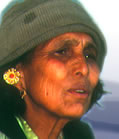 |
 |
||
 |
|||
|
RELATED THEMES economics employment and income gender OTHER LOCAL THEMES BACKGROUND |
migration
Migration is not new to these narrators - for example, many interviewees or their forefathers moved to Sindhupalchok because farming was poor in the old location - but the scale is dramatically increasing and the direction is away from the hills to the cities or plains. Migration has been identified as a major issue in Nepal's hills, with many and complex effects on those left behind and the host communities. While the impetus has been primarily economic, the new collection (Nepal 24-32) suggests that since the start of the Maoist insurgency in 1996, even more people are leaving rural areas to escape the violence and uncertainty. Men in search of waged work go to Kathmandu, India and the Gulf. While women are left behind bearing much of the agricultural burden of work as well as domestic, several narrators are resigned to the need for migration, and feel the benefits can be more than economic: "For 12 months it is difficult to survive on farming alone. How to meet other expenses? .They do not earn money only when they go out [for work]; they also bring wisdom with them. They understand what to say and how to talk. They learn what and how things happen in places" (Nepal 31). Another (Nepal 32) whose two sons work in Kathmandu, says: "Men have to go to the city to earn money. Staying at home won't bring money. Now, my sons bring whatever their children desire to eat. Whatever they want to wear, they bring. Now if the sons had stayed home in the village, what would have happened?" In the area where many of the first interviews were collected (Nepal 1-23) there was a high incidence of girls going to India to take up prostitution: some are tricked into it or kidnapped by traffickers; some are sent by their parents, because they see this as the best economic option in dire circumstances. A few girls, narrators claim, do so of their own volition, seeking a more sophisticated life. The practice was so widespread that some narrators seem to accept it as inevitable, but others voice their disapproval: "I don't like it. I feel they are selling their pride to another country" (Nepal 4). Those who do return have done much to tell others about the reality of life as a prostitute, and of the dangers of HIV/AIDS. However, one narrator (Nepal 4) claims the majority of returnees talk about going back again; they are often not fully accepted back into the community and may be shunned as marriage partners. Nepal 30 is a first-hand account by a 23-year-old who went to Kathmandu to find work and was tricked into being taken to India and sold to a brothel. Her story provides a moving and realistic counterpart to the conjecture and even prejudice of others who comment on the practice. Another interesting account of migration is that of a woman who left the hills to find work in Kathmandu's carpet industry (Nepal 24). The massive drop in tourists because of the Maoist insurgency has damaged the carpet industry, and Goma now finds herself trapped without savings or a job, or the possibility of returning to village life. quotes about migration"At times I wonder why I came and started to learn weaving carpets. I used to get excited hearing about Kathmandu. Being one's own capital city, we really imagined Kathmandu to be a beautiful place. I also looked forward to coming - during those days. Yes, wisdom did fail me. I do feel like returning [to the hills] but I don't have a single paisa. now people will laugh if one goes back without anything, since that was the reason for coming to Kathmandu." "The difference is there, the men go away to India to work but women cannot go away. the women have to stay back to look after the house, the children, the animals and the fields. No matter how difficult the life is we cannot leave our house just because men have gone away. There are cases where the husband had gone away searching for work and never came back, but the women have stayed back working in wages or doing odd jobs to look after their children because of the love for their children. The men can go away for 15 days without any information but [women] cannot go away even for a day.because they can't leave their house and children." "There was not [the practice of migration in the past]. There were one or two males in total from this village in government service, that's all. Now many boys work outside village. Some outward (outside Nepal), some homeward (within Nepal). Now.one or two from almost all houses in the village work in town. Before, all used to go to India. These days.there are more in Kathmandu. Now some of them are in the Gulf states." "I didn't see any benefit for those who go to work there (India). They only make profit for another country. If they go to foreign countries then they will make good profit. They spend 15, 16 years abroad, they have to return one day. When they return they don't have anything here. It is very bad for them." "The clever ones earn and bring back lots of money but the others, they earn and spend and come back empty-handed." "In those days they took everyone from here. Every 10-12 days one girl would go missing from the village. But now this kind of work is decreasing; it became less. It may be due to ActionAid or because of girls' own awareness, that has stopped a little bit of the girl trafficking in Bombay. Villagers also raise their voice and beat the people who come to the village to take the girls from here. That's why that kind of person is not seen these days. It has been two years not a single girl has been taken to Bombay from here." |
|